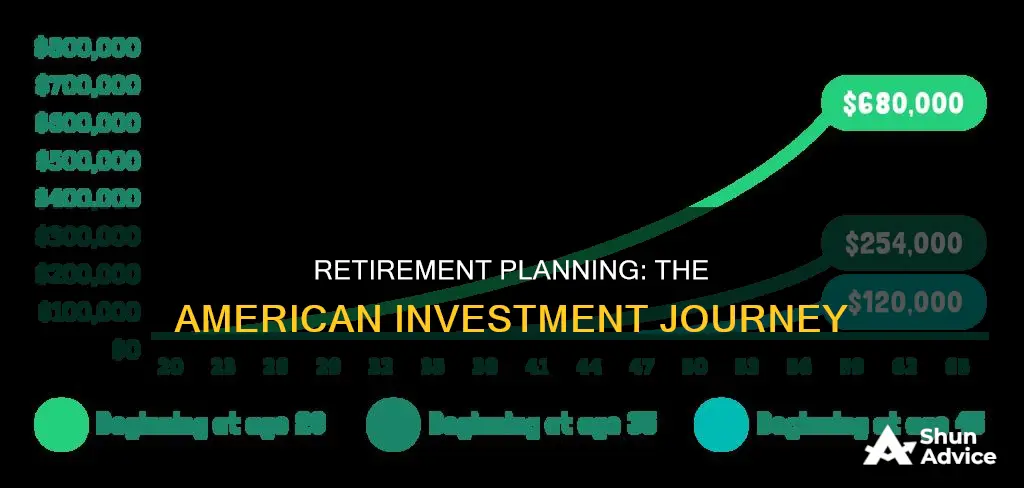
The average American should begin investing for retirement as early as possible, ideally in their 20s, straight after graduating and landing their first job. This is because the earlier you start, the more time your money has to grow. Each year's gains can generate their own gains the next year, in a powerful wealth-building phenomenon known as compounding.
However, according to a Morning Consult report, only 39% of US adults who are saving for retirement started in their 20s. A quarter began in their 30s, and another quarter waited until their 40s or beyond. A separate survey from Nationwide found that the average age to start saving was 31.
What You'll Learn
- The average American should begin investing for retirement in their 20s
- The longer you wait to start investing, the more you'll need to invest each month
- Financial experts advise putting away at least 10% of your income each month
- The average retirement savings for all families is $333,940
- You can invest in a 401(k) or IRA retirement plan

The average American should begin investing for retirement in their 20s
Retirement may seem like a distant prospect when you're in your 20s, but starting to invest early gives your money more time to grow. The average American should begin investing for retirement in their 20s to benefit from compound interest and reach their retirement savings goals.
The power of compound interest means that the earlier you start saving, the more time your money has to grow. Each year's gains can generate their own gains the next year, and this process is known as compounding. The longer your money is invested, the more time it has to benefit from this effect.
For example, if you start saving for retirement at 25 and put aside $3,000 a year for 10 years, by the time you reach 65, your $30,000 investment will have grown to over $338,000, assuming a 7% annual return. However, if you wait until you're 35 and then save $3,000 a year for 30 years, you'll only have around $303,000 by the time you're 65, even with the same annual return.
Financial experts recommend saving at least 10% of your income each month for retirement. The exact amount you should save depends on your individual circumstances, including your job, expenses, and other financial obligations. A good rule of thumb is to save between 10% and 15% of your income, but even saving a small amount is better than nothing.
Where should you invest?
There are several options for investing for retirement, including employer-sponsored plans, such as 401(k)s, and individual retirement accounts (IRAs). If your employer offers a 401(k) plan, this is a great place to start investing due to the tax benefits and potential employer matching contributions. You can also open a traditional IRA or a Roth IRA, which offer different tax advantages.
The bottom line
The average American should start investing for retirement in their 20s to take advantage of compound interest and give their savings time to grow. While it may seem challenging to save for retirement when you're just starting your career, even small contributions can make a big difference in the long run.
Savings Indirectly Matched with Investors
You may want to see also

The longer you wait to start investing, the more you'll need to invest each month
The longer you wait to start investing, the more ground you'll need to make up when you finally do begin. The earlier you start investing, the more time your money has to grow. Each year's gains can generate their own gains the next year, thanks to compound interest.
For example, let's say you start investing for retirement at 22 and put in $200 a month for 10 years, earning a 6% average annual return. At the end of the decade, you'll have put in $24,000 and will have $33,300. But if you wait until you're 32 to start investing that same $200 a month, you'll need to invest for 35 years to reach the same amount. That's 25 extra years of investing just to make up for lost time.
Now, let's say you want to retire at 65 with $700,000 in your retirement fund. If you start saving at 31, you'll need to save around $450 per month, assuming a 7% annual rate of return. But if you wait until you're 40, you'll need to save roughly $925 per month to reach that same goal. And if you delay until you're 50, you'll have to save a whopping $2,300 per month.
Starbucks: Worth Your Investment?
You may want to see also

Financial experts advise putting away at least 10% of your income each month
Financial experts recommend putting away a minimum of 10% of your monthly income to ensure a comfortable retirement. This is part of the broader 50/30/20 rule, which suggests that 50% of your monthly income should cover essentials, 30% is for discretionary spending, and at least 20% should be put into savings.
Retirement savings are a crucial part of the savings component, and the earlier you start, the better. The power of compound interest means that even small amounts saved in your 20s can grow into a substantial nest egg by the time you retire. For example, if you start saving at 25, you could have over $300,000 by the time you're 65, even if you only saved $3,000 a year for the first ten years and then stopped. However, if you wait until you're 35 to start saving the same amount, you'd only have about $300,000 by 65.
Starting early also means you can take advantage of any employer 401(k) match programs. These programs typically require you to contribute a certain percentage of your salary to receive the full benefit. For example, if your employer matches 3% of your salary, you should contribute at least that much. Otherwise, you're leaving free money on the table.
Additionally, the longer you wait to save, the more you'll need to contribute each month to reach your retirement goals. For instance, if you want to retire at 65 with $700,000, you'd need to save about $450 per month if you start at 31. But if you wait until you're 40, that number jumps to $925 per month, and if you delay until 50, you'd need to save a hefty $2,300 per month.
So, while it can be challenging to think about retirement when you're just starting your career, it's crucial to make it a priority. The best time to start saving is now, even if it's just a small amount. You can always increase your contributions as your earnings grow.
Pay Off Auto Loans or Invest: The Smart Choice for Your Money
You may want to see also

The average retirement savings for all families is $333,940
Retirement savings balances tend to increase with age, due to factors such as increased earnings over time, compound interest, and more. The Survey of Consumer Finances found that nearly 50% of families headed by someone under 35 had retirement accounts, with an average value of $49,130 and a median value of $18,880. For those aged 35-44, the average value of retirement holdings was $141,520, and the median value was $45,000.
Financial experts advise that people should start saving for retirement as early as possible, preferably in their 20s when they first start earning a paycheck. This is because the sooner you begin saving, the more time your money has to grow. Each year's gains can generate their own gains the next year through compound interest. If you start saving at age 25, you would need to save $486.97 per month to reach $1.7 million by age 65, assuming an 8% rate of return. However, if you wait until age 30, you would need to contribute $741.10 per month to reach the same goal.
While it is ideal to start saving early, the next best time to start investing for retirement is right now. If you cannot afford to invest hundreds of dollars a month, start with whatever you can afford, even if it is just $10 or $20 per month. You can also take advantage of tax benefits by contributing to a 401(k) plan if your employer offers one.
Fitness Investment: What's the Priority?
You may want to see also

You can invest in a 401(k) or IRA retirement plan
When it comes to investing for retirement, the general consensus is that the earlier you start, the better. Financial experts advise that you should begin saving and investing for retirement as soon as you can, with some suggesting that you should ideally put away at least 10% of your income each month.
One of the most popular ways to invest for retirement is through a 401(k) or IRA plan. These plans offer tax advantages and can help you build a comfortable nest egg for your retirement. Here's a closer look at each option:
K) Plan:
- A 401(k) is a retirement plan offered by your employer.
- It allows you to contribute a portion of your paycheck pre-tax, reducing your taxable income.
- Many employers will match your contributions up to a certain percentage, which is essentially free money for your retirement.
- The contribution limit for 2024 is $23,000 if you're under 50, and $30,500 if you're 50 or older.
- If your employer offers a 401(k) match, it's recommended to contribute at least enough to get the full match.
- You can enroll in your company's 401(k) plan and take advantage of the tax benefits and any employer matching contributions.
IRA (Individual Retirement Account):
- An IRA is a retirement account that you open and manage yourself.
- It offers more flexibility and investment choices compared to a 401(k).
- You can open an IRA through a bank, brokerage company, insurance firm, or investment company.
- IRAs typically have a wider range of investment options, including mutual funds, exchange-traded funds (ETFs), and individual stocks and bonds.
- The contribution limit for 2024 is $7,000 if you're under 50, and $8,000 if you're 50 or older.
- You can contribute to both a 401(k) and an IRA, but there may be tax implications and income limits to consider.
By utilizing a 401(k), IRA, or a combination of both, you can take control of your retirement savings and benefit from the tax advantages and investment options that these plans offer. Remember, the key to successful retirement planning is to start as early as possible and contribute consistently over time.
Venture Capital: The Allure of High-Risk, High-Reward Investing
You may want to see also
Frequently asked questions
As soon as you can. Ideally, you'd start saving in your 20s, when you first leave school and begin earning paychecks. That's because the sooner you begin saving, the more time your money has to grow.
According to the Survey of Consumer Finances, the average retirement savings for all families was $333,940. The average retirement savings by age is:
- Under 35: $30,170
- 35 to 44: $131,950
- 45 to 54: $254,720
- 55 to 64: $408,420
- 65 to 74: $426,070
- Over 70: $357,920
This is a very personal question and will depend on your job, expenses, and other obligations. In general, it is a good idea to save 10% to 15% of your income, but even saving less is better than not saving at all.







